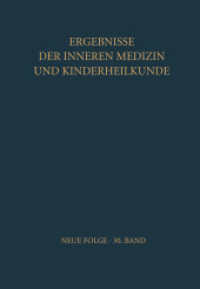- ホーム
- > 洋書
- > 英文書
- > Politics / International Relations
Full Description
Lee and editors bring together a group of international scholars to map the overall landscape of "de-risking" China -- a concept that drew consensus among the Group of Seven (G7) countries.
Divided into three themes of conceptual evolution, national responses of individual Indo-Pacific countries and prospects of success with featured case studies, this groundbreaking work explores the origins and developments of "de-risking" China in a region that will define the 21st century. Drawing on rich findings by different scholars, it demonstrates that a wide spectrum of variations exists insofar as the Indo-Pacific countries' observance to the concept of 'de-risking' China.
This is a must-read book for academics, scholars and university students of International Relations and Political Science, as well as those interested in understanding the evolving dynamics of "de-risking" China among the Indo-Pacific countries today.
Contents
List of Contributors
Introduction
1. De-Risking China: The Evolution of European Strategic Thinking (2019-2024)
2. US and De-risking China
3. Germany's Strategic Balancing Act: Navigating Economic Dependence and Systemic Rivalry with China
4. China's Mitigation of Chips-Derisking by the West (US, the Dutch and Chips4)
5. Japan's Evolving Approach to Economic Security under U.S.-China Rivalry: A Departure from the Pacifist State?
6. Navigating Risk: South Korea's Strategic Approach to China
7. De-risking China: Taiwan as Method
8. Between Security and Economics: India's De-risking Strategy towards China
9. Indonesia's Responses to 'De-risking' China vis-à-vis the US and Allies: The Nexus of Domestic and International Interest
10. In the Dragon's Shadow: How Has Vietnam's Selective "De-risking" Strategy Played Out?
11. Malaysia's Multi-Alignment Approach to "De-risking" China Wave: The Quest for Semiconductor Powerhouse
Conclusion
Index








